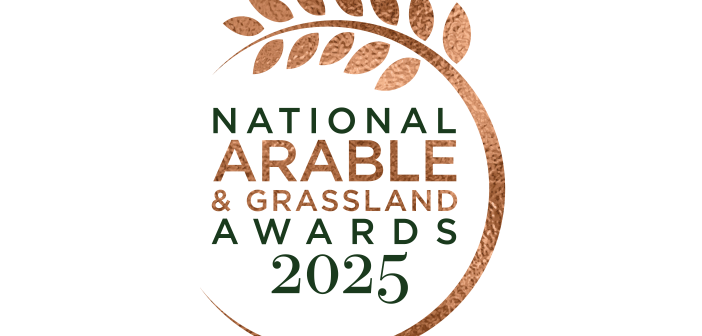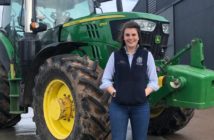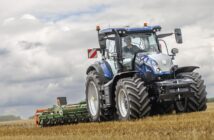This award is for individuals aged 30 and under who are actively managing an arable or grassland business. The panel of judges will assess candidates based on their demonstrated commitment to the industry, as well as their enthusiasm and innovative strategies toward farming. Sponsored by Cefetra.
Kyle Catlin – Kyle Catlin Contracting
Not from a farming background, Kyle’s introduction to agriculture began aged 13. He would cycle eight miles before school and at weekends to help out at a local dairy farm.
Fast-forward another 13 years and he now has a 200-head commercial sheep flock and additional small flocks of native rare-breed sheep and pedigree Hereford cattle.
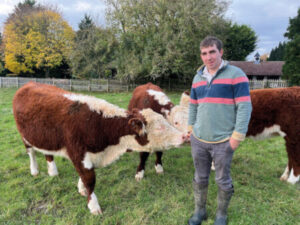 Following a foundation degree at Shuttleworth College, he established himself as a small-scale contract labourer for farms and smallholdings. Working on a variety of farms, including a vineyard, has expanded his knowledge significantly. He has future ambitions to establish a farming business that is profitable as well as sustainable.
Following a foundation degree at Shuttleworth College, he established himself as a small-scale contract labourer for farms and smallholdings. Working on a variety of farms, including a vineyard, has expanded his knowledge significantly. He has future ambitions to establish a farming business that is profitable as well as sustainable.
For the moment, he is helping others achieve that. For example, he implemented cover crop grazing to replenish soil organic matter for an arable farm customer, which also provides a respite for the grassland.
Establishing native breeds such as Dorset Downs and pedigree Herefords also helps cut soil compaction, as they are typically lighter than the continentals.
Once a farm business tenancy is secured, the aim is to transition to a more regenerative system by using livestock in the arable rotation and mixed farming methods. The integration of livestock should cut the reliance on synthetic fertilisers. By combining conventional and traditional methods, he believes a sustainable farming business can be achieved.
Bethany Sharpe – S Sharpe & Daughter Fruit and Veg
Losing her mother in 2021 and her father being diagnosed with cancer in 2022 quickly put a lot of responsibility on Bethany’s shoulders. But she faced up to those challenges and is proof that enterprise can be a good alternative to scale.
Bethany grew up on the family farm, in her words helping out “sporadically”. But since 2017, she has worked with her father to overcome further challenges and maintain a healthy business.
Regulation changes caused them to cease trading on Lincoln’s Cornhill Market and open a farm shop, which has turned into a thriving business. Alongside their fruit and vegetables, they retail a variety of foodstuffs.
When the Covid-19 pandemic struck it presented particular challenges to retailers. The Sharpes responded by delivering vegetable boxes to their customers.
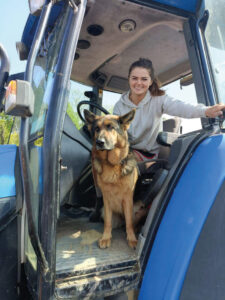 Since then, Bethany has set about making the business more sustainable. It now harvests all the rainwater into a reservoir or tanks to use throughout the year. Biological controls such as parasitic wasps are being employed. Any compost or waste is worked back into the land or given to a local pig farm to use as feed, and the farm always grows a patch of sunflowers to support bee and bird populations.
Since then, Bethany has set about making the business more sustainable. It now harvests all the rainwater into a reservoir or tanks to use throughout the year. Biological controls such as parasitic wasps are being employed. Any compost or waste is worked back into the land or given to a local pig farm to use as feed, and the farm always grows a patch of sunflowers to support bee and bird populations.
Bethany admits she can find the job challenging at times, but insists she wouldn’t want to do anything else.
Maria Warne-Elston – Warne & Son
Maria originally set out on a career in the veterinary sector, but gradually the call to return to farming got stronger. After five years as a veterinary nurse, she went back to what she “enjoys most”. She has now been back on the family farm for three years, helping it move towards agroecological farming practices.
It has seen the use of more herbal and white clover lays and introducing wider mob-grazing. With correct care it should extend maintenance to 10 years, reducing reseeding costs with total sward dry matter yields reaching 10-11t/ha/year.
Legumes have been introduced to boost nitrogen levels, and oilseed rape was planted to fatten lambs for slaughter and improve soil structure while also decreasing weed pressure, reducing the need for synthetic nitrogen fertiliser and fungicides and improving carbon sequestration.
Maria was instrumental in the switch from Charolais to Hereford bulls for easier calving, less input and better temperament. It took her a few years to convince her dad, but better profits have persuaded both it was the best choice.
She has proved to be very resourceful. Using a portable handing system and portable clippers has saved hours of time. Contractors are only used for shearing – self-sufficiency saves costs and increases profits. She even sells daggings to local gardeners, making money out of this “waste” material.
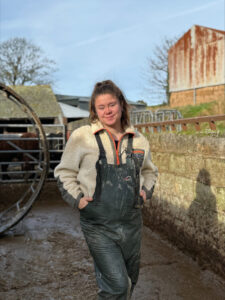 Maria is an ambassador for Yellow Wellies to highlight mental health issues and fundraise with the likes of RABI. Through social media she is spreading the word for farming to bridge the gap between farmer and consumer. Direct help and advice have helped more than 70 young people get into the industry, something she is very proud of.
Maria is an ambassador for Yellow Wellies to highlight mental health issues and fundraise with the likes of RABI. Through social media she is spreading the word for farming to bridge the gap between farmer and consumer. Direct help and advice have helped more than 70 young people get into the industry, something she is very proud of.

